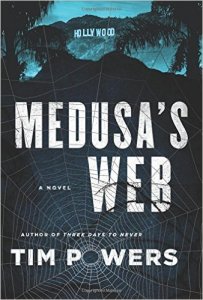Gary K. Wolfe reviews Tim Powers
Medusa’s Web, Tim Powers (William Morrow 978-0-06-226249-3, $26.99, 360pp, hc) January 2016.
 For some years, off and on, Tim Powers has been exploring various aspects of what might be called American cryptomythology, though never quite with the consistency with which he reinvented 18th- and 19th-century England in novels ranging from The Anubis Gates to 2012’s Hide Me Among the Graves. He probably came closest in Last Call, which tapped into Vegas lore and somehow connected it with the Fisher King (a recurrent Powers trope), and he touched upon Hollywood’s rich mine of fantasy in Three Days to Never, which features a secret lost Chaplin movie and bits of time travel. But we’re still waiting for the full-bore secret history which takes advantage of Powers’s considerable knowledge of the byways of Hollywood in the way that the Victorian-era novels take advantage of Powers’s shadow London.
For some years, off and on, Tim Powers has been exploring various aspects of what might be called American cryptomythology, though never quite with the consistency with which he reinvented 18th- and 19th-century England in novels ranging from The Anubis Gates to 2012’s Hide Me Among the Graves. He probably came closest in Last Call, which tapped into Vegas lore and somehow connected it with the Fisher King (a recurrent Powers trope), and he touched upon Hollywood’s rich mine of fantasy in Three Days to Never, which features a secret lost Chaplin movie and bits of time travel. But we’re still waiting for the full-bore secret history which takes advantage of Powers’s considerable knowledge of the byways of Hollywood in the way that the Victorian-era novels take advantage of Powers’s shadow London.
Medusa’s Web isn’t quite that novel, although like Three Days to Never, it also features a California setting, a mysterious lost film of the silent era, and bits of time travel. Tantalizing historical clues show up involving a drawing by Aubrey Beardsley and the mysteries surrounding the deaths of early film pioneers William Desmond Taylor and Thomas Ince, and even Rudolph Valentino gets a walk-on, but for the most part Powers limits his focus to a rather epically dysfunctional Hollywood family and their various betrayals and alliances. Madeline Madden and her brother Scott have long since moved out of the creepy Hollywood Hills mansion (ominously named Caveat) where they were raised, but are summoned back following the spectacular suicide – by grenade – of their Aunt Amity, who largely raised them after their parents disappeared when they were children, and who made her later living as the author of a series of mystery novels set in 1920s Hollywood. Still living in the house, though, are their cousins Claimayne and Ariel, who clearly aren’t thrilled to have them back, even though it’s a condition of the aunt’s will. The house itself, as is often said of haunted-house narratives, is very nearly a character in its own right, decorated with rotting bits of old movie sets and demolished hotels, and while Powers directly alludes to ‘‘The Fall of the House of Usher’’, there are also moments – mostly involving the cranky, scheming, wheelchair-bound Claimayne – when it reminded me just as much of the Addams Family.
The real secret of the house, and of the family, turns out to involve talismanic images of eight-legged figures called spiders (one was that Beardsley drawing), which may or may not be interdimensional beings who have somehow invaded the world and whose powers involve a kind of time travel. There are enough spider addicts around, it turns out, that even little shops sell ‘‘spiderbits,’’ such as distorting lenses that will interfere with the spider image’s magic. Any family members who glimpse such an image, even a crudely drawn one or a random occurrence of the figure, might find themselves in another place or time, occupying the body of someone contemporary to that time or place. Caveat, the house, has been the scene of so many such episodes over the decades that it’s apparently riddled with something like time-holes, and thus the few days Madeline and Scott spend there are pretty hazardous. Indeed Madeline may be in danger of coming under the spell of Aunt Amity herself – whose own backstory is one of the more effective revelations in the book. Time travel through secret gateways was of course a chief conceit of the novel that first brought Powers to wide attention, The Anubis Gates, but in Medusa’s Web the various trips to different times and places, most significantly 1920s Hollywood, are too fragmented and fleeting for us to realize the deeply evocative sense of time and place that made that novel so effective. There are some wonderful such scenes, and when Powers has Scott realize that a room he visited in the past is now a vacant spot in mid-air, we get a palpable sense of the layers of Hollywood history that haunt this landscape. The more we learn about Aunt Amity’s secrets, about what really happened to Scott and Madeline’s parents, and about the shadowy figures who seem to be pursuing them, one of whom provocatively calls himself Polydectes (from the Medusa legend), the more the mystery deepens, finally centering on a lost reel of film that may contain the secret to banishing the spiders entirely. As always with his complicated plots, Powers manages to pull all the strings together in a satisfying way, but as appealing and vulnerable as Scott and Maddy might be, as ingeniously as the time-switches are worked out, his most resonant characters remain mostly offstage, and his most compelling mythic dimension is available mostly through glimpses rather than immersion.






